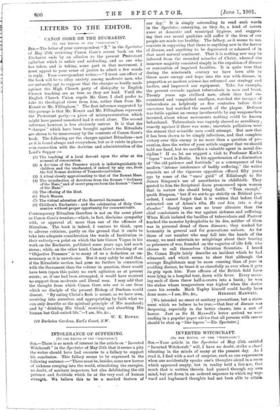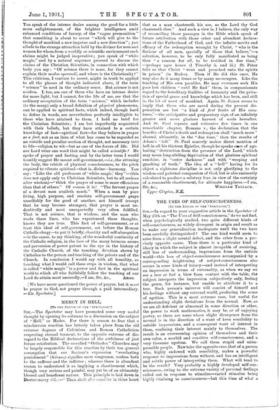INVERTED WITCHCRAFT.
[To THE EDITOR OF THE "SPECTATOR.") SIR,—Your article in the Spectator of May 25th entitled "Inverted Witchcraft" will, I have no doubt, strike a chord vibrating in the minds of many at the present day. As I read it, I find with a sort of surprise, such as one experiences when one accidentally speaks one's thoughts aloud in a room which appeared empty, but in reality held a listener, that much that is written therein had passed through my-own mind, but set down in an ordered sequence to which my way- ward and haphazard thoughts had not been able to attain. You speak of the intense desire among the good for a little more enlightenment, of the brighter intelligence amid enhanced conditions of luxury, of the "vague premonition" that something is about to occur "which will give to the thought of mankind a new impetus and a new direction"; you allude to the strange attraction held by the diviner for men and women for whom from a worldly or scientific environment such claims might be judged inoperative ; you speak Of "white magic," and by a natural sequence proceed to discuss the claims of the Christian Scientists, in connection with which body you say : "Of science there is none, for they cannot explain their modus operandi, and where is the Christianity?" This criticism, I venture to assert, might in truth be applied to all the phases of thought indicated above, if the term "science" be used in the ordinary sense. But science is not wisdom.. I, too, am one of those who have an intense desire for more light, but I cannot, for the life of me, see that the ordinary acceptation of the term science," which includes (to the many) only a broad definition of physical phenomena, can be applied to spiritual facts, which indeed, though bard to define in words, are nevertheless perfectly intelligible to those who have attained to them. I hold no brief for the Christian Scientists ; I am but imperfectly acquainted with their beliefs, but they have attained to a certain knowledge of fact—spiritual fact—for they believe in prayer as a fact, not as an item of what has come to be regarded as an outside and peculiar section of thought, not necessary (sic) to life—religion to wit—but as one of the forces of life. Did our Lord utter one word that might be called scientific I He spoke of prayer and fasting, and by the latter term I would humbly suggest He meant self-government—i.e., the attuning the body, the vehicle of physical consciousness, to the pitch required to vibrate spiritual—that is, divine—harmony. You say: "Like the old professors of 'white magic,' they "—(this does not apply only to Christian Scientists, but to all seekers after wisdom)—" think the prayer of some is more efficacious than that of others." Of course it is! "The fervent prayer of a devout man availeth much." When a man by pure living; high purpose, and resolute self-government prays unselfishly for the good of another, not himself (except that he may become stronger), that prayer is most un- doubtedly and most unexpectedly very often fulfilled. That is not science, that is wisdom, and the man who reads these lines, who has experienced these thoughts, knows they are true. This fact of self-government, or at least this ideal of self-government, set before the Roman Catholic clergy—to put it briefly, chastity and self-abnegation —is the cause, to my thinking, of the wonderful continuity of the Catholic religion, in the face of the many heinous errors and perversion of power patent to the eye in the history of the Catholic Church, of the touching devotion shown by Catholics to the person and teaching of the priests and of the Church. In conclusion I would say with all humility, as touching what I would call these steps in wisdom, that what is called "white magic "is a power and fact in the spiritual world to which all who faithfully follow the teaching of our
Lord do attain most assuredly.—I am, Sir, &c., Anao.
[We have never questioned the power of prayer, but it must be prayer to God, not prayer through a paid intermediary. —ED. Spectator.]







































 Previous page
Previous page